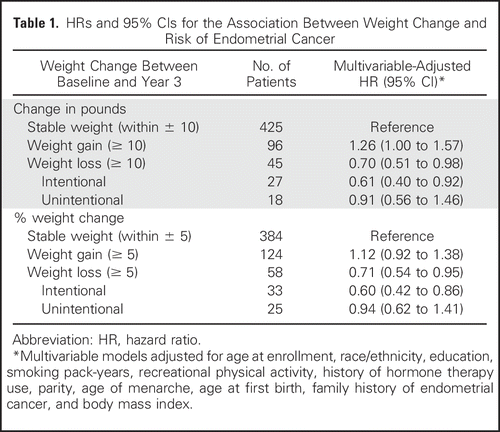The link between endometrial cancer and obesity is the strongest of all cancers studied; obesity is also strongly linked to breast and colon cancer. In the Iowa Women’s Health Study, patients who intentionally lost at least 20 pounds demonstrated a risk of endometrial cancer equivalent to non-obese patients. A supplemental analysis suggested that intentional loss of 10 pounds also reduced risk.
The Women’s Health Initiative (WHI) included over 36,000 women who were followed for a mean of 11.4 years. Weight was evaluated prospectively over a three-year period; the primary endpoint was the development of endometrial cancer following the three-year study visit. Over the course of the study, 566 women developed endometrial cancer:
After analyses were adjusted for baseline BMI and other potential confounders, women who had weight loss ≥ 5% had a significantly lower risk of endometrial cancer than women who had stable weight (HR, 0.71; 95% CI, 0.54 to 0.95). This was observed for any weight loss, but the risk was even lower for obese women who had intentional weight loss (HR, 0.44; 95% CI, 0.25 to 0.78).

Table 1. HRs (hazard ratio) and 95% CIs (confidence interval) for the Association Between Weight Change and Risk of Endometrial Cancer. http://ascopubs.org/doi/full/10.1200/JCO.2016.70.5822
In a sensitivity analysis of weight loss and endometrial cancer subtypes, a stronger association was seen between intentional weight loss and risk of type I (estrogen-dependent) endometrial cancer compared with overall results (including type II tumors – serous and mixed cell). For example, compared with women who had stable weight (± 5%), women who had intentional weight loss had a 52% lower risk of type I endometrial cancer (HR, 0.48; 95% CI, 0.30 to 0.76) overall; obese women who had intentional weight loss had a 74% lower risk compared with obese women with stable weight (HR, 0.26; 95% CI, 0.12 to 0.57). Women who intentionally lost weight and had a normal BMI at 3 years (ie, < 25 kg/m2) had the same risk of endometrial cancer as women who maintained a stable normal BMI.
Unintentional weight loss was NOT associated with reduced risk of endometrial cancer.
To our knowledge, this study is the first to use measured baseline and follow-up weights with weight loss intentionality examined over a relatively short period to temporally link measured weight change in postmenopausal women. In this setting, modest weight loss was associated with a significantly lower risk of endometrial cancer. Additionally, although intentional weight loss was associated with a significantly lower risk of endometrial cancer, unintentional weight loss was not. These findings suggest that, in postmenopausal women, it may not be too late for weight loss to offer potential health benefits.
We have previously discussed the link between obesity and cancer on this blog. Briefly, there are three mechanisms by which obesity contributes to the development of cancer:
- Obese patients have increased levels of insulin and IGF-1 (insulin-like growth factor 1), therefore, greater stimulation IGF-1R (insulin-like growth factor receptors), which drive cell growth and cell division;
- Adipocytes have direct and indirect effects on cellular signaling molecules (stimulation of mTOR – mammalian target of rapamycin, which is one of the terminal Akt/PKB pathway effectors resulting in myc induction, and inhibition of AMP-activated protein kinase which blocks mTOR induction of myc);
- Obesity induces a chronic subacute level of inflammation, which promotes the development of cancer.
